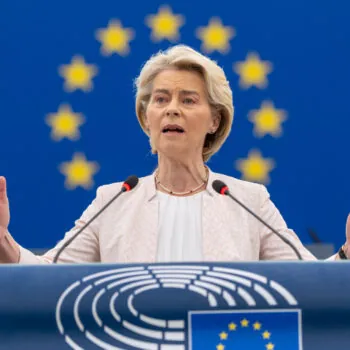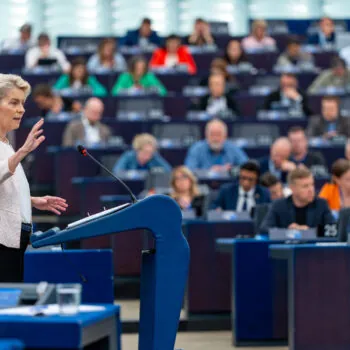Remarks by Mr Tom Burke CBE at a plenary meeting of the British Energy Efficiency Federation, on September 22nd 2023 on teams.
When Andrew Warren invited me to speak at this meeting a week or so ago, neither of us knew what was about to happen.
Indeed, even the Prime Minister did not know that I would find myself speaking to you in a rather different policy world from the one in which I accepted Andrew’s invitation.
As we now all know, the speech the Prime Minister made on Wednesday was originally scheduled for this afternoon.
This would have made it a Friday for Saturday story somewhat lowering the attention it received and thus its impact.
This would also have limited the ability of the critics of its proposals to get a hearing as I suspect no.10 well knew.
Futhermore, the House of Lords would have been prevented from subjecting the clearly inadequately prepared minister to what can only be described as a shellacking by his peers.
It might also have somewhat reduced the visible anger of the commons speaker, Lindsay Hoyle, at the Prime Minister making a major policy announcement to the media and not to parliament.
As it is, the fate of the best-laid plans of mice and men has, on this occasion, prevented my remarks this morning from having been almost instantaneously overtaken by events.
So for that, at least, I am grateful.
I cannot say the same about the content of the speech which is the most flagrant and egregious example of a Prime Minister putting party before nation in my forty-odd years of active engagement in public policy.
What I would like to do this morning is to separate the policy from the politics of the Prime Minister’s speech. They both matter. But in different ways.
In E3G we have a young, very bright and committed staff who have both a personal as well as a professional interest in keeping the climate safe.
Having had the opportunity as a special advisor to see government from within as well as without, I find myself from time to time having to explain the difference between policy and politics.
Put simply, policy is a map of how you can get from where you are to where you want to be. In this case, from a carbon-heavy to a carbon-free energy system.
Politics is the journey. That is, how do you get yourself, and all the people who have to come with you, to make the journey?
Simply repeating the advantages of the possible routes for getting from here to there may not be enough to persuade someone it is worth making the trip.
I often also find myself pointing out to E3G that while facts may change policy, it is narrative that changes politics.
What the Prime Minister has just done is sacrifice a crucially important national policy on a political altar – or to be more precise – on an electoral altar.
He has replaced a detailed and compelling policy case with a tendentious and dishonest political narrative.
So let me say something first about the policy and then about the politics.
There were some elements of the speech that were not really about either. These were the promises the Prime Minister made to ban the taxing of meat and flying, to stop compulsory car-pooling and to halt the requirement for every house to have seven bins for recycling.
These policies were laid low with a mighty slash of the Prime Minister’s rhetorical sword.
Except that none of them had ever existed. Someone, somewhere, at some time, may well have suggested them to someone but none of them have ever been proposed by this or any previous government.
Having slain these phantasms, and shown how tough he can be, the Prime Minister then did get on with doing some serious damage to public policy.
There were three substantive proposals in the Prime Minister’s speech: on vehicles, on boilers and energy efficiency targets. Clearly, the one that matters most this morning is the promise that there would be no new energy efficiency regulations.
I did not use the word ‘egregious’ at the beginning of my remarks casually.
One of the most repeated reasons for this speech is the Prime Minister’s concern not to impose ‘unnecessary’ burdens on those least able to afford them.
Quite who he thinks will suffer most if we fail to keep the climate safe has yet to be discovered.
I also wonder who he thinks lives in rented accommodation.
Private renters have been among the worst hit by the cost of living crisis.
Until Wednesday, their landlords faced the prospect of raising all their properties to EPC C by 2028 for all tenancies. No longer.
Two-thirds of privately rented properties are below EPC C. This will add £ 1.1 billion more to the renter’s bills than will be paid by those in well-insulated homes.
Raising rented homes to EPC C could prevent over 600,000 children from asthma and prevent six thousand winter deaths a year. Which would also greatly reduce cost pressures on the NHS.
We calculate that if private renters’ homes had been insulated to EPC C we might have saved some £8 billion in the public expenditure cost of dealing with the energy crisis.
This sets a new standard in cutting off noses to spite faces.
The case for the other substantive policy proposals in the speech is just as weak.
So, if these policies make no economic, social or environmental sense why is the Prime Minister so keen on them?
Which brings us to the politics.
The Prime Minister’s government is in serious trouble. It is 20 percent behind in most polling with an election due within 12 months.
It has had a sequence of by-election losses. And there are more to come soon.
It has acquired in the eyes of everyone but Victoria Newton, Ted Verrity and Chris Evans, an unenviable reputation for chaos, incoherence and failure to deliver.
Was it really just the other week that the Prime Minister went on television to assure everyone he was committed to retaining the vehicle policies he has just dropped?
Then the Uxbridge by-election seemed to open a door to salvation.
The government retained a byelection seat that it – and everyone else – had assumed it would lose. And the reason for the victory was their opposition to the extension of the ULEZ zone to the constituency.
Never mind that an air pollution measure, initiated by a Conservative politician, had nothing to do with getting to net zero. The Prime Minister’s election Svengali, Isaac Levido, saw an opportunity.
The Prime Minister could send a strong signal to those left behind voters who had brought them the red wall seats at the last election that he was on their side, understood their concerns and would protect their interests.
And there was a bonus.
This would set a trap for Keir Starmer. He would be forced to choose between the older, left behind voters north of London that he needs to win back the red wall or the younger, greener, urban, southern voters with which he has an advantage.
This political strategy links the opposition to ULEZ, the recent retreat on river pollution standards and the breaking of Britain’s world-leading political consensus on net zero.
I know the Prime Minister has insisted that he is still committed to net zero but the Climate Change Committee warned him some time ago that he needed to do more if he was to get there.
He has yet to explain how doing less will achieve the same as doing more. However, he will soon have an opportunity in court as the judicial review of his proposed pathway returns.
I have chosen to focus more on the politics of energy efficiency than the policy because the Prime Minister has made it clear that there will be more politics where this came from.
I think this means that simply offering to improve the valuable economic, social and climate benefits that you have been, and will continue to, offer the people of this country is unlikely to make much difference to the government’s energy efficiency policy.
You will have to consider what you can do to change the politics.
You would not be alone in trying to do so. We drafted a letter to the Prime Minister on Wednesday asking him not to weaken the government’s net zero policies.
We invited a wide range of bodies to sign on to the letter.
Within five hours over 400 bodies had agreed. They included businesses such as Nestle, IKEA, Aviva investors and E.ON as well as smaller businesses, professional associations and environmental organisations and many other charities.
I have campaigned on environmental issues for fifty years and in all that time I have never experienced an issue that evoked such an immediate response from such a diversity of organisations.
Given that improving the efficiency with which we use energy is the cheapest, fastest, and fairest way to make the climate safe, I wish you well on your journey and we will help with the politics wherever we can.



